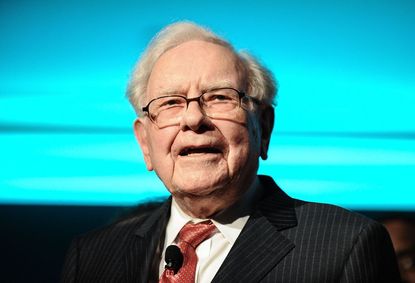Investment trusts could benefit from more optimism
Give yourself an edge with investment trusts. Finding winning stocks is no mean feat.

(Image credit: Daniel Zuchnik/WireImage)
By Max King
“Investment is simple but it’s not easy,” said Warren Buffett, implying that there was only one way to do it well – his way. Excellent though his record is, this is an exaggeration. Different rules work for different managers and being too prescriptive is a mistake.
Moreover, what works isn’t constant over time. Technology has radically altered the tools available to fund managers, who have had to adapt. Information once gleaned over lunch or a drink in the City, or by talking to indiscreet corporate management, is now instantly available on Bloomberg to tens of thousands of people worldwide.
“A desk is a dangerous place from which to view the world,” wrote John le Carré. He was talking about the craft of spying, but his observation applies equally well to investment. So pervasive are information and opinions that it is almost impossible to gain an edge from manipulating or staring at screens. It requires insight: seeing an opportunity either ignored or not identified by others.
What can fund managers do?
Most fund managers boast about how many meetings they have with boards of companies, but there are few insights to be gained in this way. Managers are always well-prepared and know what they can and cannot say. They make the same presentation to lots of analysts and brokers and have thoroughly rehearsed the answers to predictable questions.

The fund manager, following hundreds of firms, can never compete in terms of knowledge against a team working full-time for a company. He or she can, however, apply a broader perspective that is not available to management, bring to bear knowledge learned from other companies and walk away if they don’t like what they see. This rarely requires a meeting, but a busy schedule of meetings impresses colleagues, investors and the fund managers’ bosses.
Visiting companies is better, but not guaranteed to give the fund manager an edge. It is usually interesting, even fun, it’s a nice day out of the office, it reminds fund managers that they are investing in businesses, not pieces of paper, and can provide priceless insight, although not usually about the company visited.
The larger fund-management companies employ a multitude of analysts to assist their fund managers, but this does not necessarily improve outcomes. It can lead to groupthink, a lack of accountability for decisions and an inability to see the wood for the trees. Great investment ideas, especially for contrarian investors, are often the result of inspiration, not perspiration.
Peter Lynch, who, as manager of Fidelity’s Magellan Fund returned a compound 29% per annum for 13 years, advocated the use of personal experience or that of friends and family in the workplace, the shopping centre and elsewhere in daily life to identify investment opportunities missed by the experts. This hardly fits into the “investment process” that fund managers talk about. But, along with checking some numbers, it can result in what Lynch called “ten-baggers”.
“My favourite holding period is forever” is another of Warren Buffett’s quips. But as James Harries manager of the STS Global Income & Growth Trust points out, he didn’t say it was his only holding period. Harries advocates “low turnover, not no turnover”: in the case of STS, about 10% a year.

Craig Baker, the manager of Alliance Witan Trust, likes to show that “while global markets have always been concentrated in the top-ten companies by market value (as they are now), there is little sequential order from decade to decade”. IBM was in the world’s top ten for three decades and Exxon for four, but neither is in the top ten now.
No company in today’s top ten, other than Microsoft, featured 20 years ago. Some from earlier decades – Kodak, and AT&T – have disappeared and many others, such as General Motors, General Electric, Nokia and Cisco, are shadows of their former selves.
Beating the benchmark
Investment trusts provide much greater longevity because managers can maintain their standing by altering their investment policy and slowly shifting their portfolios. Still, strategies such as the value-orientated one favoured by STS can be out of favour for considerable periods of time, while investors in Baillie Gifford’s trusts have found out that great performance is not sustainable indefinitely.
Every fund manager wants to beat their benchmark index. However, most don’t, and none do so consistently. Investment trusts, thanks to structural advantages, are best placed to do so. Research has shown that the best blueprint for outperformance is a portfolio very different from the benchmark index and with low turnover – but that also risks marked under-performance.
Investors seek to outperform not just by picking the best managers, but also the best style or speciality. Over the last five years, Baker points out, investing in growth companies has worked, returning 92% against 41% for “value” (cheaper companies with lower growth). Many argue that it is time for the pendulum to swing back, given the good long-term record of value investing, but they have been wrong for some time.
Likewise, smaller companies have a well-documented record of long-term out-performance, but have now underperformed for eight years. There is speculation about a return to favour for the Chinese market, but its long-term record relative to India is catastrophic. Baker’s advice is “to take profits from outperformers and add to underperformers”, otherwise known as portfolio rebalancing, but that involves selling winners to buy losers – the opposite of what conventional wisdom says investors should do.
Should you trust trusts?
Managing a portfolio of investment trusts is neither simple nor easy, but it’s a lot better than direct investment. Yet many investors waste far too much time worrying about economics and geopolitics. There are times when prophetic warnings are visible (to those who look well outside the mainstream), but they are swamped by the avalanche of dud calls.
Equally tempting are measures of the valuation of markets. Surely the US market is expensive and the UK cheap? Yes, but maybe that is for good reasons, such as the greatly superior earnings growth of US companies. Many investors swear by the “cyclically adjusted price/earnings ratio”, which briefly showed the US market to be cheap at the end of 2008, but otherwise not for 30 years.
When Nathan Rothschild was asked about the secret of his success, he replied: “I never buy at the low and I always sell too soon”. He also advised investors “to buy when there’s blood on the streets” and “to buy on the sound of cannons, sell on the sound of trumpets”. Market sentiment provides a very useful contrary indicator, but strong signals are infrequent. So what are investors to do when the signals aren’t clear?
Michael Mainelli, the retiring Lord Mayor of London (a scientist, not a financier) reminds us that “the opposite of danger is taking risks” and provides the excellent advice: “Let’s be optimistic; pessimism is for better times”. After all, in the last 100 years, Wall Street has risen in three years out of four years.
This article was first published in MoneyWeek’s magazine
















